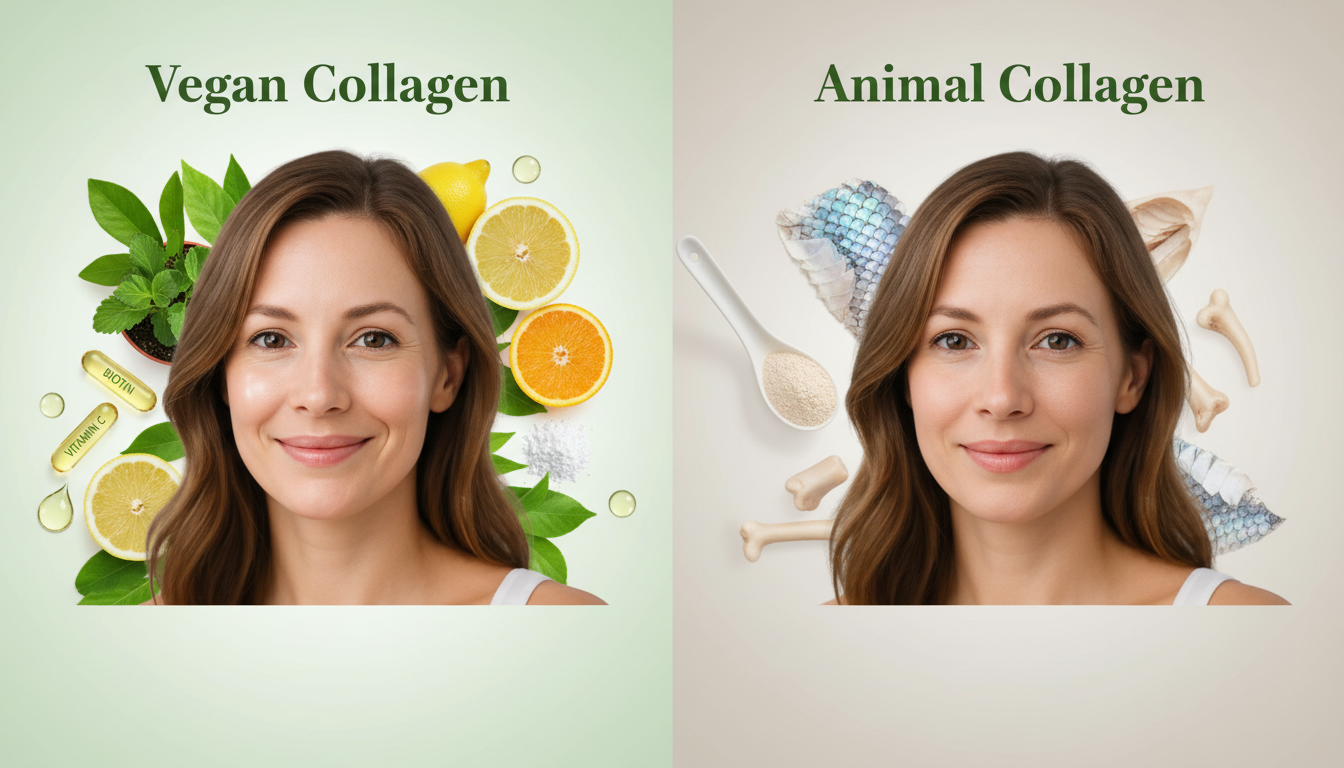Collagen has become the beauty industry’s most celebrated buzzword — praised for its power to smooth wrinkles, strengthen hair, and restore youthful glow. But not all collagen is created equal. Today, the conversation has expanded beyond marine and bovine collagen powders to include a new, ethical alternative: vegan collagen.
As more people prioritise sustainability, cruelty-free living, and holistic wellness, the debate between vegan collagen vs. animal collagen is gaining momentum. So, which one is truly better for your skin, hair, and overall wellbeing? Let’s break down the science, the ethics, and the results.
Understanding Collagen: The Foundation of Youthful Skin
Collagen is the most abundant protein in the human body. It provides structure, elasticity, and strength to the skin, hair, nails, and connective tissues. From your complexion’s firmness to the flexibility of your joints, collagen is essential to nearly every aspect of physical vitality.
Unfortunately, as we age, our natural collagen production declines — often beginning in our mid-twenties. This decline leads to common signs of ageing: fine lines, sagging skin, joint stiffness, and brittle nails.
For years, animal-derived collagen supplements were considered the gold standard for replenishing lost collagen. But with the rise of plant-based nutrition and greater awareness around sustainability, vegan collagen has entered the spotlight as a kinder, cleaner alternative.
Animal Collagen: Traditional Approach to Beauty Nutrition
Animal collagen is typically sourced from either bovine (cow) or marine (fish) sources. The raw materials — such as hides, bones, or fish scales — are processed into hydrolysed collagen peptides, which are more easily absorbed by the body.
How It Works
When you consume animal collagen, your digestive system breaks it down into smaller peptides and amino acids. These components are then absorbed into the bloodstream and used by the body to produce new collagen fibres in the skin, joints, and other tissues.
Benefits
-
May improve skin elasticity and hydration
-
Supports joint health and muscle recovery
-
Promotes stronger hair and nails
Limitations
While many users report visible improvements after consistent use, there are limitations to consider:
-
Ethical concerns: Derived from animal by-products, raising questions about cruelty and sustainability.
-
Dietary restrictions: Unsuitable for vegans, vegetarians, and those avoiding animal-based ingredients.
-
Environmental footprint: Marine collagen harvesting and livestock farming both carry ecological costs.
For decades, animal collagen was the only option available — until science found a plant-powered alternative.
Vegan Collagen: The Ethical, Sustainable Innovation
Unlike traditional collagen, vegan collagen is 100% plant-based. Rather than supplying actual collagen protein (which only exists in animals), vegan collagen formulas are crafted to support the body’s own collagen synthesis.
They combine plant-derived amino acids, vitamin C, hyaluronic acid, biotin, and MSM (methylsulfonylmethane) — all nutrients known to boost collagen production naturally. This makes vegan collagen both functional and cruelty-free, aligning perfectly with modern wellness values.
How It Works
Vegan collagen doesn’t replace collagen directly. Instead, it delivers the building blocks and co-factors your body needs to stimulate collagen formation in the dermis — the layer of skin where collagen is produced.
Key Ingredients
-
Vitamin C: Essential for collagen synthesis and antioxidant protection.
-
Hyaluronic Acid: Improves skin moisture retention and smoothness.
-
Biotin: Strengthens hair, nails, and skin barrier function.
-
MSM: Aids joint comfort and supports collagen cross-linking.
The result is a formula that enhances your skin’s natural glow, boosts hydration, and contributes to overall wellness — all without relying on animal sources.
Absorption: How Well Do They Work?
Absorption and bioavailability are common points of debate when comparing animal collagen vs vegan collagen.
Animal collagen supplements contain hydrolysed collagen peptides, which are pre-digested and readily absorbed by the body. Once absorbed, the amino acids act as signals that may trigger collagen production.
Vegan collagen, on the other hand, provides plant collagen peptides — amino acids sourced from plants — plus nutrients that encourage the body to make collagen naturally. While these may take slightly longer to show visible effects, they support a broader physiological process rather than delivering pre-formed proteins.
In essence, both approaches work — but differently:
-
Animal collagen: Delivers peptides directly for immediate replenishment.
-
Vegan collagen: Stimulates long-term, sustainable collagen formation from within.
For many health-conscious consumers, the choice depends less on absorption speed and more on ethics, sustainability, and overall lifestyle fit.
Beauty Benefits: Skin, Hair & Nails
Both vegan and animal collagen offer visible and tangible beauty benefits, though their pathways differ.
Skin Glow and Hydration
Animal collagen provides peptides that may increase skin hydration and elasticity within weeks. Vegan collagen supports the body’s collagen-making process by improving the quality of amino acids and co-factors required for collagen synthesis — leading to healthier, more radiant skin over time.
Hair Strength and Nail Growth
Biotin, MSM, and plant amino acids found in vegan collagen can strengthen keratin structures in hair and nails. Many users report shinier hair and fewer brittle nails after consistent use.
Anti-Ageing Support
By enhancing elasticity, moisture retention, and dermal density, both collagen types can reduce the appearance of fine lines. However, vegan collagen has the added advantage of including antioxidants such as vitamin C, which fight oxidative stress — one of the major causes of premature ageing.
Spotlight on Viking Remedies Vegan Collagen
One of the leading names in the vegan collagen space is Viking Remedies — a Scandinavian wellness brand known for its science-backed, ethical supplements.
Their Vegan Collagen Liquid delivers an impressive 10,000 mg of vegan collagen per serving, enriched with 50 mg of hyaluronic acid, vitamin C, biotin, and MSM.
It’s sugar-free, non-GMO, dairy- and gluten-free, made in Sweden in a HACCP-certified facility, ensuring high-quality standards. The berry flavour makes it pleasant to take daily — either on its own or mixed with water, juice, or a smoothie.
Viking Remedies recommends 25 ml per day, offering a convenient addition to your morning wellness routine. With options from £21.99 per bottle (and discounted multi-bottle bundles), it’s an affordable and premium choice for anyone seeking a sustainable, cruelty-free collagen source.
As the brand explains:
“Vegan collagen is a plant-based formula designed to mimic the amino acid profile of traditional collagen.”
This statement underlines their commitment to authenticity and transparency — ensuring users understand that vegan collagen supports, rather than replaces, the collagen-making process.
For conscious consumers, Viking Remedies represents the perfect balance of science, sustainability, and self-care.

Which One Should You Choose?
Ultimately, the best collagen supplement depends on your individual goals and values.
Choose animal collagen if you:
-
Want a more traditional, peptide-based supplement
-
Are not restricted by dietary or ethical preferences
-
Seek quick results for joint health and elasticity
Choose vegan collagen if you:
-
Prefer cruelty-free collagen and sustainable sourcing
-
Follow a vegan or plant-based diet
-
Want a formula that nourishes overall wellness as well as beauty
-
Value transparency, natural ingredients, and environmental responsibility
While animal collagen may deliver faster visible results, vegan collagen offers a long-term, holistic approach to health and beauty — aligning with modern lifestyle priorities of clean nutrition and conscious living.
Summary:
The comparison between vegan collagen vs. animal collagen highlights a bigger shift in the beauty and wellness world: the move towards sustainable beauty supplements that care for both people and the planet.
Vegan collagen may be newer to the market, but its benefits — from supporting natural collagen production to promoting hydration, radiance, and joint health — make it a compelling choice for today’s mindful consumers.
With brands like Viking Remedies leading the charge, the future of collagen is ethical, plant-powered, and beautifully sustainable. Whether you’re after luminous skin, stronger hair, or a more compassionate approach to wellness, vegan collagen is proof that you don’t have to compromise results for your values.


Share:
Reviving Beauty and Wellness with Vegan Collagen